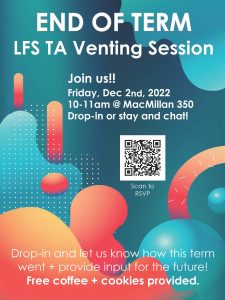Land and Food System Scholar Series
Invited scholar: Dr. J. Bruce German
Hosted by: Siyun Wang, Food Science
Title: Lactation: An evolutionary model for diet and health research.
Abstract: The world is facing unprecedented challenges to produce a food supply that is both nourishing, safe and sustainable. Scientists are struggling to understand how to guide the future of agriculture and food in response to these 21st century challenges. Lactation provides an inspiring model of what research and its applications could be. Lactation emerged through evolution under the relentless selective pressure to be a sustainable bioreactor secreting biopolymers with diverse functions acting from the mammary gland through the digestive system of the infant. Scientific understanding of milk yields targets of efficacy: what are the mechanisms by which diet can improve the protection, performance and success of infants; with an impeccable safety dosser: milk is all that babies eat! As just one example, milk contains free oligosaccharides. These glycans reach the lower intestine where bacteria compete. One specific strain of bacteria, Bifidobacterium longum subspecies infantis, is capable of taking up, hydrolyzing and metabolizing the complex glycans of human milk. Such a symbiotic relationships provides value to both the microbe and the infant: the microbe gains a food supply and the infant gains protection from pathogens.
Biography: Dr. J. Bruce German is a Distinguished Professor in Food Science and Technology, Director, Foods for Health Institute, University of California Davis (http://ffhi.ucdavis.edu/). Bruce German received his BSc and MSc from University of Western Ontario, his PhD from Cornell University, joined the faculty at the University of California, Davis in 1988, in 1997 was named the first John E. Kinsella Endowed Chair in Food, Nutrition and Health is currently Director of the Foods for Health Institute and professor, at University of California, Davis. The goal of his research, teaching and outreach is to build the knowledge necessary to improve human health through personal health measurements and diet. The model being used of how to proceed is lactation, the product of millennia of constant Darwinian selective pressure to produce a food to nourish, sustain and promote healthy infant mammals to be healthier http://www.imgconsortium.org/ . This evolutionary logic is the basis of the research program to discover molecular, physical, functional and nutritional properties of milk components and to apply these properties as principles to foods. Bruce and colleagues have published more than 500 papers that have been cited over 50,000 times. Together with colleagues and the University of California the research program has launched 4 companies providing products and services to the commercial marketplace.
Join in-person or via Zoom:
Date: December 8, 2022
Time: 10:00-11:30 AM PST
Location: In-person at SPPH B151, or via Zoom
This presentation will be followed by a meet and greet from 11:30-12:00.
Please register here by Dec 6.
